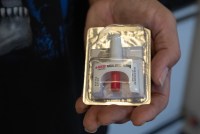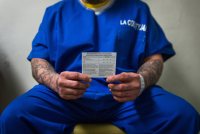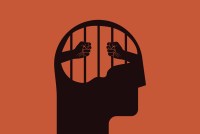Latest KFF Health News Stories
Newsom Offers a Compromise to Protect Indoor Workers from Heat
After rejecting proposed rules to protect millions of workers in sweltering warehouses, steamy kitchens, and other hot workplaces, California Gov. Gavin Newsom’s administration has offered a compromise to allow the protections to take effect this summer. But state and local correctional workers — and prisoners — would have to wait even longer.
California Fails to Adequately Help Blind and Deaf Prisoners, US Judge Rules
Thirty years after prisoners with disabilities sued and 25 years after a federal court first ordered accommodations, a judge found that California prison and parole officials still are not doing enough to help deaf and blind prisoners — in part because they are not providing readily available technology such as video recordings and laptop computers.
Secret Contract Aims to Upend Landmark California Prison Litigation
California has commissioned an exhaustive study of whether its prisons provide a constitutional level of mental health care, which it could use to try to end one of the lawsuits that have federal courts overseeing the state’s prisons. But corrections officials won’t disclose even basic details of the consultants’ contract, including its cost to taxpayers.
California May Face More Than $40M in Fines for Lapses in Prison Suicide Prevention
A court expert reported that California prisons continue to lag on 14 of 15 suicide prevention measures, and even regressed in some areas. The state could face more than $40 million in fines after a federal judge warned more than a year ago that she would impose penalties for each violation.
Readers Call on Congress to Bolster Medicare and Fix Loopholes in Health Policy
KFF Health News gives readers a chance to comment on a recent batch of stories.
Pregnancy Care Was Always Lacking in Jails. It Could Get Worse.
A lack of oversight and standards for pregnancy care in jails is becoming more problematic as the number of incarcerated women rises and abortion restrictions put medical care further out of reach.
Death and Redemption in an American Prison
More than a quarter century after an inmate helped start a hospice program in one of the nation’s most notorious prisons, he is trying to spread the idea.
California Prison Drug Overdoses Surge Again After Early Treatment Success
Drug overdose deaths in California state prisons rebounded to near record levels last year, a big setback for corrections officials who thought they were on the right track with medication-assisted treatment efforts. Prison officials and attorneys representing prisoners blame fentanyl.
Mental Health Courts Can Struggle to Fulfill Decades-Old Promise
Mental health courts have been touted as a means to help reduce the flow of people with mental illness into jails and prisons. But the specialized diversion programs can struggle to live up to that promise, and some say they’re a bad investment.
Most States Ban Shackling Pregnant Women in Custody, Yet Many Report Being Restrained
Advocates for pregnant people in police custody say repeated incidents show prohibitions on handcuffs and other restraints are little more than lip service.
A New Covid Booster Is Here. Will Those at Greatest Risk Get It?
The CDC says everyone over 6 months old should get the new covid booster. But the emergency response mechanisms that supported earlier vaccine campaigns are gone. As one expert wonders: How to get boosters to people beyond Democrats, college graduates, and those with high incomes?
Montana State Officials Seek More Control Over Judicial Involuntary Commitments
Health department officials are asking legislators to change criminal commitment laws amid a bottleneck at the Montana State Hospital.
The Painful Legacy of ‘Law and Order’ Treatment of Addiction in Jail
Efforts to improve addiction care in jails and prisons are underway across the country. But a rural Alabama county with one of the nation’s highest overdose rates shows how change is slow, while law enforcement officials continue to treat addiction as a crime rather than a medical condition.
California Promises Better Care for Thousands of Inmates as They Leave Prison
California officials recently agreed to give new parolees a 60-day supply of their prescriptions and promised to replace lost medical equipment in the month after they’re released from prison. The state also agreed to submit Medi-Cal applications on their behalf at least 90 days before they are released.
California Confronts Overdose Epidemic Among Former Prison Inmates
Individuals newly released from prison are 40 times as likely to die of opioid overdoses than members of the general population, researchers say. In response, California corrections officials aim to arm departing inmates with an antidote that can be used to reverse the effects of opioid poisoning.
As US Life Expectancy Falls, Experts Cite the Health Impacts of Incarceration
In a nation with one of the highest incarceration rates in the world, imprisonment speeds the aging process, research shows. Some experts complain the federal government isn’t collecting or releasing data that could identify disease patterns and prevent deaths.
Journalists Track Opioid Settlement Cash and Fees for Telehealth Visits
KFF Health News and California Healthline staff made the rounds on national and local media this week to discuss their stories. Here’s a collection of their appearances.
States Try to Obscure Execution Details as Drugmakers Hinder Lethal Injection
Pharmaceutical companies have put the brakes on many states’ ability to execute prisoners using lethal injections. Lacking alternatives, states are trying to keep the public from learning details about how they carry out executions.
Reentry Programs to Help Former Prisoners Obtain Health Care Are Often Underused
More than 600,000 people are released from prisons every year, many with costly health conditions but no medications, medical records, a health care provider, or insurance.
Judge to Fine California Each Day It Fails to Complete Prisoner Suicide Prevention Measures
More than 200 inmates killed themselves during eight years in which state prison officials failed to complete court-ordered suicide prevention safeguards. Inmates, the judge writes, have “waited far too long” for adequate mental health care.


























